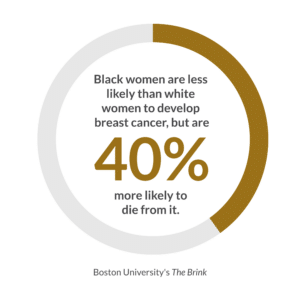Black Women & Healthcare: Why the Disparity?
January 31, 2024
Imagine discovering a lump in your breast. Your doctor checks you, sees the concern in your eyes, in your voice. He doesn’t ask you any questions, barely examines you, and instead suggests you’re overreacting. Even worse, he implies that you’re wasting his time.
For millions of Black women in the US, this kind of treatment is an everyday reality. It’s as if medical discrimination has been mortared into the foundation of the US healthcare system.
Before we ask the question of how this can be happening, it’s important to understand a fundamental fact: Generations of Black Americans bear in their bodies the impact of decades of racism and discrimination.
Generations of Black Americans bear in their bodies the impact of decades of racism and discrimination.
In a KFF-researched timeline of how history has shaped racial disparities in healthcare, the evolution of discrimination can be easily traced to the early 1800s when enslaved women endured medical experimentation, mostly related to “reproductive viability.” Early surgeons tested cesareans and procedures for ovarian cancer on vulnerable Black women in the name of science, often without anesthesia. Cruel and inhumane, these practices promoted the racist belief that Black people feel less pain than whites, a racial bias that still exists in modern healthcare.
“Weathering” or generational trauma often manifests in Black lives in physiological, psychological, and emotional stress, as well as negative self-esteem, depression, and internalized oppression. These conditions compound the complications of the Black community seeking and getting the healthcare they need.
All these factors — singularly and collectively — pose great risk to Black women’s health, presenting a host of unique challenges that other people groups do not face.
Racial Disparities in Healthcare
Two centuries removed, the healthcare disparities for Black women continue to be complex, pervasive, and damaging. The dark history of medical discrimination impacts all people of color, but especially Black women. But back to the question, How can this be?
There are four major factors contributing to racial disparities in healthcare for Black women:
1. Limited Access to Insurance and Quality Care
Black women are less likely to have health coverage because many live in geographic areas where healthcare infrastructure is substandard, says KFF research. It is also common for Black women to have transportation challenges and longer travel times to hospitals, often delaying essential medical care.
2. Exposure to Environmental Hazards
Black communities, often due to historical segregation patterns, are more likely to be located in areas with higher levels of air pollution. They are also more likely to live in older homes with lead-based paint or lead pipes. These increased exposures can cause respiratory issues, diseases, developmental issues in children, and adverse birth outcomes for Black women, among other adverse health effects. Boston University’s The Brink shared a 30-year study that revealed Black women to be more likely to die from cardiovascular disease, stroke, lupus, and various cancers than any other racial or ethnic group.
3. Economic Deprivation
Higher poverty rates and reduced access to supermarkets and affordable nutrition combined with fewer educational opportunities all contribute to healthcare disparities among Black women. Economic instability limits healthcare options, medications, and preventive measures. Black women are more likely to delay treatment if they can’t afford it, and the results can be deadly. In addition, less education means less health literacy, making it challenging for Black women to navigate the healthcare system and advocate for their own well-being.
4. Medical Systemic Biases
Black women often encounter stereotypes and prejudices from within the medical establishment that diminish their humanity and the level of care they receive. The New York Times shared some examples of systemic biases:
- Doctors dominate the conversation more when the patient is Black. They don’t ask as many questions as they do white patients and are often more skeptical of Black patients’ concerns.
- Black women are routinely met with skepticism when reporting pain levels and are even sent away without treatment that is medically necessary.
- Black women are asked repeatedly about their marital status, insurance, employment, and other “qualifying factors” in healthcare situations.
Medical Discrimination
Experts who study bias and race in healthcare agree that a vast majority of medical providers have good intentions, but that even those who reject overt racism have unconscious bias that can influence the way they interact with patients.
A vast majority of medical providers have good intentions, but that even those who reject overt racism have unconscious bias that can influence the way they interact with patients.
Sarah M. Wilson, an assistant professor at Duke University told The New York Times that the brain is wired to make decisions quickly and can use cognitive shortcuts when you are uncertain, tired, or stressed. These shortcuts can let bias seep in, especially in an environment like a busy hospital or practice where fatigue and stress are common, and doctors are treating patients they don’t know. According to Wilson, when faced with highly complex situations that demand quick decision-making, it is natural for automatic assumptions to be made.
There are two key areas in which Black women are especially vulnerable to racial bias in healthcare:
1. Maternity Healthcare
Black women experience disproportionately high maternal mortality rates compared to their white counterparts. According to the Centers for Disease Control and Prevention, Black women are three times more likely to die from pregnancy-related complications than their white counterparts. Factors such as inadequate prenatal care, preexisting health conditions, and socio-economic disparities contribute to this alarming trend. Implicit biases also play a role, as Black women often do without the same level of attention, empathy, and care during pregnancy and childbirth, leading to increased risks.

2. Cancer Care
Black women often have limited access to preventive screenings, early detection, and timely treatment. Financial insecurity and mistrust of medical institutions may contribute to delays in seeking healthcare and adhering to treatment plans. More research shared by The Brink reveals that Black women are less likely than white women to develop breast cancer, but those who do are 40% more likely to die from it.
Black Women Deserve Better
It’s unfathomable that in 2024 these kinds of racial disparities still exist in our society, that Black women’s health is systemically viewed as somehow less important than the health of others. We can and must do better. But how?
First, we can acknowledge and actively work to dismantle the implicit bias in our healthcare system, which can only be achieved through:
- Cultural Competence Training
- Healthcare Workforce Diversity
- Addressing Socio-Economic Barriers
- Community Engagement
By prioritizing inclusivity and equity, the healthcare system can evolve to better serve the diverse needs of all individuals, ultimately leading to improved health outcomes for everyone. Black women, like all women, deserve nothing less.
How Willow House Can Help
If you or a woman you care about is struggling with trauma, intimacy issues, or co-occurring disorders, Willow House at The Meadows is here to help. Our caring professionals see every woman who comes through our doors as uniquely as they are. We will customize a treatment plan to meet your specific needs so you can receive the help and care you need to begin your recovery journey. Reach out today to learn more.
